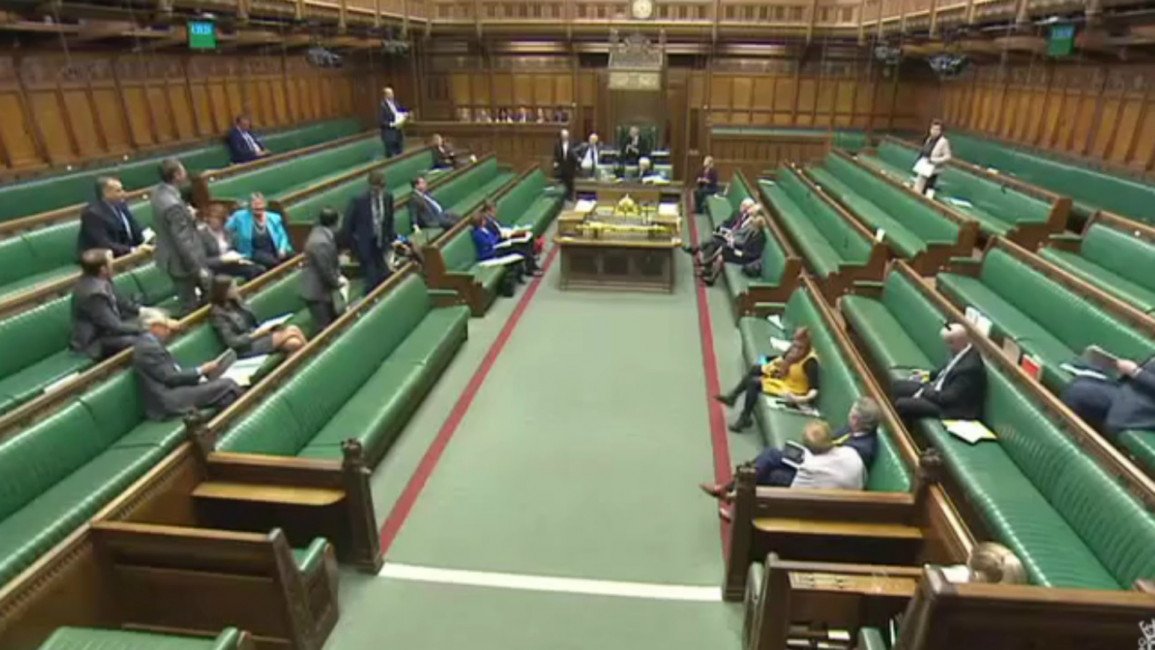
No 'emergency' in British MPs debate on Aleppo massacres
The clue was in the title. The crisis is an emergency; an urgent, humanitarian tragedy. Civilians are dying now, and they will continue to die while bombs rain down on homes and hospitals.
A solution to Syria's bloody civil war continues to elude world powers.
A US-Russia diplomatic stalemate is threatening to bring more weapons into the conflict, while the UN's aid convoys can only reach beseiged towns with Bashar al-Assad's blessing.
No amount of international outrage and comdemnation has stopped the regime's assault.
But does the frustration of failed resolutions excuse a lack of a coordinated response altogether?
|
— James Sadri (@halfiranian) October 11, 2016" style="color:#fff;" class="twitter-post-link" target="_blank">Twitter Post
|
While Parliament does not keep a list of attendance for a debate - as MPs drift in and out of the chamber - a recording of the debate shows some 71 MPs at the beginning of the proceedings. That is just over 10 percent of the 650 elected MPs, and numbers from there on.
The disappointing turnout did not go unnoticed - and observers were dismayed.
— Sean Arbuthnot (@Sean_Arbuthnot_) October 11, 2016
" style="color:#fff;" class="twitter-post-link" target="_blank">Twitter Post
|
MP Andrew Mitchell opened proceedings acknowledging the "unfolding humanitarian catastrophe" in Aleppo, putting Syria on a par with the UK leaving the European Union.
"The effects of the crisis in Syria on our children and our grandchildren will be every bit as great as the effects of Brexit," he said.
— Salman Shaikh (@Salman_Shaikh1) October 11, 2016
" style="color:#fff;" class="twitter-post-link" target="_blank">Twitter Post
|
— Billy (@bcb2294) October 11, 2016
" style="color:#fff;" class="twitter-post-link" target="_blank">Twitter Post
|
MPs discussed implementing a no-fly zone, creating safe havens for civilians, and allowing aid to be dropped over beseiged areas.
But the three-hour debate, which ended with Foreign Secretary Boris Johnson telling people to picket the Russian embassy, failed to instigate a clear plan of action which would give residents of Aleppo some longed-for relief.
As MP Alistair Burt put it: "Intervention has consequences. But so does non-intervention."
The MPs who spoke:
Andrew Mitchell (Conservative)
Tom Tugendhat (Con)
Albert Owen (Labour)
John Redwood (Con)
Jeremy Lefroy (Con)
Tom Brake (Liberal Democrat)
Nadhim Zahawi (Con)
Caroline Lucas (Green)
Jonathon Djanogly (Con)
Jason McCartney (Con)
Mike Gapes (Lab-Co-op)
John Woodcock (Lab-Co-op)
Angela Smith (Lab)
Robert Flello (Lab)
Graham Jones (Lab)
Bob Stewart (Con)
Ben Bradshaw (Lab)
Kevin Foster (Con)
Toby Perkins (Lab)
Emily Thornberry (Lab)
Richard Drax (Con)
Alistair Burt (Con)
Ian Murrary (Lab)
Stella Creasy (Lab-Co-op)
Liz Kendall (Lab)
Patrick Grady (SNP)
Sammy Wilson (DUP)
Dame Caroline Spelman (Con)
Stephen Crabb (Con)
Ann Clwyd (Lab)
Stephen Twigg (Lab-Co-op)
Mike Kane (Lab)
Sir Desmond Swayne (Con)
Alison McGovern (Lab)
Madeleine Moon (Lab)
Gavin Robinson (DUP)
Peter Grant (SNP)
Hywel Williams (PC)
Mary Creagh (Lab)
Sir Nicholas Soames (Con)
Brendan O'Hara (SNP)
Margaret Ferrier (SNP)
Michael Gove (Con)
Boris Johnson (Con)
Hilary Benn (Lab)
Mark Durkan (SDLP)




